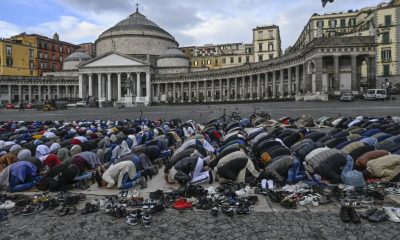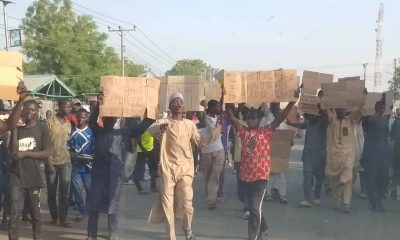International
Peshawar: 32 dead, 150 wounded in large explosion at Pakistan mosque

At least 32 people have died and around 150 are wounded after a suicide bomb attack on a mosque located in Peshawar’s Police Lines area during Monday afternoon prayers.
Witnesses say the attacker walked to the front row of the mosque before detonating a suicide vest, with the force of the blast causing the roof of the building to collapse.
Many of the victims were police officers, with the mosque located inside a highly fortified compound that includes a counter-terror department and the provincial police headquarters.
No group has yet claimed responsibility for what officials said was likely a targeted attack on the security forces and one of the worst suicide bombings in recent years, although the Pakistani Taliban have been blamed for similar suicide attacks in the past.
Prime minister Shehbaz Sharif described the incident as a suicide attack and called on members of his Pakistan Muslim League (N) party livinng in Peshawar to donate blood.
READ ALSO:
- Viral Video: My campaign bus was hijacked by APC thugs- Jandor
- Obasanjo worries about depreciating economy, govt appointments based on favouritism
- Sowore tackles Peter Obi for accepting donation from SS2 Student
Officials gave varying tolls for the number of worshippers inside the mosque at the time of the explosion, ranging from 260 to around 350. A hospital official told the Reuters news agency that 147 wounded had been taken for treatment, and that some of them were in critical condition.
Spokesperson Mohammad Asim said the Lady Reading Hospital of Peshawar was taking in the majority of the victims and that the area has been cordoned off with only ambulances allowed to enter.
The blast took place at 1.40pm, according to local media outlets.
A survivor, 38-year-old police officer Meena Gul, said he was inside the mosque when the bomb went off. He said he could hear cries and screams after the bomb exploded.
A photograph published in local media showed people gathered around the collapsed wall of the mosque.
Another video shared on Twitter by Khurram Iqbal, a reporter with local TV channel Hum News, showed chaotic scenes outside the mosque with scores of people surrounding the area as a bulldozer entered a narrow lane.
READ ALSO:
- Osun state gov, Ademola Adeleke, thrills guests as he dances to Buga amid removal saga (Video)
- Why I dumped Atiku for Tinubu – Sen Nnamani
- Oyinlola threatened to drag IG to court over non-release of report on MTN
Reacting to the reports, Pakistan’s former prime minister Imran Khan expressed his condolences for the victims and called for improvements to the country’s intelligence gathering to prevent such attacks.
“Strongly condemn the terrorist suicide attack in Police Lines mosque Peshawar during prayers,” the Pakistan Tehreek-e-Insaf party chief wrote on Twitter. “My prayers & condolences go to victims families.”
“It is imperative we improve our intelligence gathering & properly equip our police forces to combat the growing threat of terrorism.”
This is only the latest in a series of incidents of a deadly bombing in Pakistan, which has been a target of terror groups for decades. The country has witnessed a particular surge in militant attacks since November last year, when the Pakistani Taliban ended their ceasefire with government forces.
A recent report by the Pakistan Institute for Conflict and Security Studies (PICSS) stated that in 2022 alone, the South Asian nation witnessed 376 terror attacks, in which 533 people were killed.
Last year, a suicide blast inside a Shia mosque in Peshawar’s Kocha Risaldar area killed 63 people.
independent.co.uk
International
Democrats drag Trump to court over election overhaul order

Democrats drag Trump to court over election overhaul order
The Democratic Party has sued the Trump administration over an attempt to impose sweeping changes on the election systems, including requiring citizenship proof to register to vote and limiting mail-in ballot counting.
In a lawsuit filed Monday, the Democratic Party asked a federal court to block the executive order, which prevents states from counting mail-in ballots that arrive after election day. The president’s directive also requires proof of citizenship to be presented — through documents such as a passport — when registering to vote.
“The President does not get to dictate the rules of our elections,” said the lawsuit filed in Washington by the Democratic National Committee, Senate Minority Leader Chuck Schumer, House Minority Leader Hakeem Jeffries and others.
“The Executive Order seeks to impose radical changes on how Americans register to vote, cast a ballot, and participate in our democracy—all of which threaten to disenfranchise lawful voters and none of which is legal,” it added.
After signing the March 25 order, called “Preserving and Protecting the Integrity of American Elections”, US President Donald Trump described it as “the farthest-reaching executive action taken” to secure US elections.
READ ALSO:
- If anything happens to me, hold Akpabio, others responsible – Natasha
- Breaking: ‘Cancel your homecoming’ — Police tell Senator Natasha
- Lightning strike kills herder, 12 cows in Kaduna
Trump, who does not acknowledge his defeat in the 2020 presidential election, has long questioned the integrity of the US electoral system. He has repeatedly and baselessly amplified conspiracy theories about massive election fraud in the United States, particularly involving absentee voting.
Legal scholars swiftly denounced Trump’s election order as an abuse of presidential power that could prevent millions of eligible voters from casting ballots.
Advocacy groups led by the Campaign Legal Center and State Democracy Defenders Fund filed a separate lawsuit on Monday against the same executive order.
“The president’s executive order is an unlawful action that threatens to uproot our tried-and-tested election systems and silence potentially millions of Americans,” Danielle Lang of the Campaign Legal Center said in a statement.
“It is simply not within the president’s authority to set election rules by executive decree, especially when they would restrict access to voting in this way.”
Democrats drag Trump to court over election overhaul order
AFP
International
Iran warns US against attack, threatens with nuclear weapon

Iran warns US against attack, threatens with nuclear weapon
Iran would have no alternative but to acquire a nuclear weapon if attacked by the United States or its allies, an adviser to the country’s supreme leader warned on Monday, following a threat by Donald Trump.
The comments came hours after the supreme leader himself, Ayatollah Ali Khamenei, had promised to hit back if the US president made good on his threat to bomb the Islamic republic if it did not agree to a deal to curb its nuclear programme.
“We are not moving towards (nuclear) weapons, but if you do something wrong in the Iranian nuclear issue, you will force Iran to move towards that because it has to defend itself,” Khamenei’s adviser Ali Larijani said in an interview with state TV.
“Iran does not want to do this, but… (it) will have no choice,” he added.
“If at some point you (the US) move towards bombing by yourself or through Israel, you will force Iran to make a different decision.”
In an interview on Saturday, Trump had said “there will be bombing” if Iran did not agree to a new nuclear deal, according to NBC News, which said he also threatened to punish Tehran with what he called “secondary tariffs”.
Trump’s language represented a sharpening of his rhetoric, though it was not clear whether he was threatening bombing by US planes alone or perhaps in an operation coordinated with another country, possibly Iran’s nemesis Israel.
“They threaten to do mischief,” Khamenei said of the remarks during a speech on Eid al-Fitr, the holiday marking the end of the Muslim fasting month of Ramadan.
READ ALSO:
- Lagos Govt says speed limit rules have come to stay
- Aide to Israel’s Netanyahu arrested in PM corruption probe
- Kano Gov Yusuf, Sanusi linked to Eid killings
“If it is carried out, they will definitely receive a strong counterattack.”
Iranian foreign ministry spokesman Esmaeil Baqaei, in a post on X, said the threat was “a shocking affront to the very essence of international peace and security”.
Baqaei warned of unspecified “consequences” should the United States choose a path of “violence”.
Western countries including the United States have long accused Iran of pursuing a nuclear weapon, which Tehran has denied, insisting its enrichment activities were solely for peaceful purposes.
The 2015 nuclear deal between Tehran and world powers required Iran to limit its nuclear ambitions in exchange for sanctions relief.
– ‘Indirect’ channel –
On March 7, Trump said he had written to Khamenei to call for nuclear negotiations and warn of possible military action if Tehran refused.
READ ALSO:
- Amosun, Adeola engage in verbal attack over project diversion allegation
- 2027 election: Shehu Sani declares bid for Kaduna central senatorial seat
- How they murdered my Kano-bound passengers in Edo
The letter was delivered to Tehran on March 12 by UAE presidential adviser Anwar Gargash, Iranian news agency Fars reported at the time.
On Thursday, Iranian Foreign Minister Abbas Araghchi said the country had delivered a response via intermediary Oman, without detailing its content.
Araghchi said Iran would not engage in direct talks “under maximum pressure and the threat of military action”.
In his remarks, however, the minister left open the door for “indirect negotiations”.
According to NBC, Trump also said US and Iranian officials were “talking,” but he did not give details.
President Masoud Pezeshkian on Sunday said Khamenei, who as supreme leader has the final say in major state policies, had permitted indirect talks.
Oman has served as an intermediary in the past, in the absence of US-Iranian diplomatic relations severed after the 1979 Islamic revolution.
On Monday, Araghchi said the United States had received Iran’s letter.
“We have been informed by our friends in Oman that the letter has reached its destination and has been read.”
Beyond its nuclear programme, the West also accuses Iran of using proxy forces to expand its influence in the region, a charge Tehran rejects.
“There is only one proxy force in this region, and that is the corrupt usurper Zionist regime,” Khamenei said, calling for Israel to be “eradicated”.
Iran warns US against attack, threatens with nuclear weapon
International
‘Bitcoin could replace U.S. Dollar as global currency’

‘Bitcoin could replace U.S. Dollar as global currency’
BlackRock Chairman and CEO Larry Fink acknowledged in his 2025 annual letter that Bitcoin could challenge the U.S. dollar’s status as the global reserve currency.
“If the U.S. doesn’t get its debt under control, if deficits keep ballooning, America risks losing that position to digital assets like Bitcoin,” Fink wrote in BlackRock’s March 2025 letter.
The statement marks a significant shift from the head of the world’s largest asset manager, recognizing digital assets as potential alternatives to the dollar.
Throughout the letter, Fink mentioned Bitcoin seven times and the dollar eight times, signaling the growing relevance of digital currencies in financial discourse.
READ ALSO:
- Aide to Israel’s Netanyahu arrested in PM corruption probe
- Kano Gov Yusuf, Sanusi linked to Eid killings
- ‘I was offered N5bn bribe to impeach Fubara’
BlackRock’s letter frames Bitcoin as both an innovation and a risk, warning that if investors view it as a more stable long-term store of value than the dollar, it could undermine U.S. financial primacy.
Fink stressed that “two things can be true at the same time,” referring to both innovation and risk in digital asset development.
Beyond Bitcoin, Fink positioned tokenization as a transformative force for capital markets, likening it to the shift from postal mail to email.
He argued that tokenized assets could bypass financial intermediaries and democratize access to investments through fractional ownership and improved voting systems.
BlackRock also highlighted India’s digital identity system as a model for secure transactions, with over 90% of Indians verifying smartphone transactions—a benchmark for future tokenized economies.
‘Bitcoin could replace U.S. Dollar as global currency’
-

 metro13 hours ago
metro13 hours agoBREAKING: Senator Natasha defies restrictions, arrives homecoming rally by helicopter [VIDEO]
-

 metro1 day ago
metro1 day agoHow they murdered my Kano-bound passengers in Edo
-

 International2 days ago
International2 days agoIn pictures: Eid celebrations around the world
-

 metro20 hours ago
metro20 hours agoUromi: Edo residents flee towns over likely reprisal attack, arrest
-

 metro1 day ago
metro1 day ago‘I was offered N5bn bribe to impeach Fubara’
-

 metro19 hours ago
metro19 hours agoBreaking: ‘Cancel your homecoming’ — Police tell Senator Natasha
-

 metro1 day ago
metro1 day agoKano Gov Yusuf, Sanusi linked to Eid killings
-

 Sports2 days ago
Sports2 days agoNigerian boxer collapses, dies in ring during fight in Ghana

